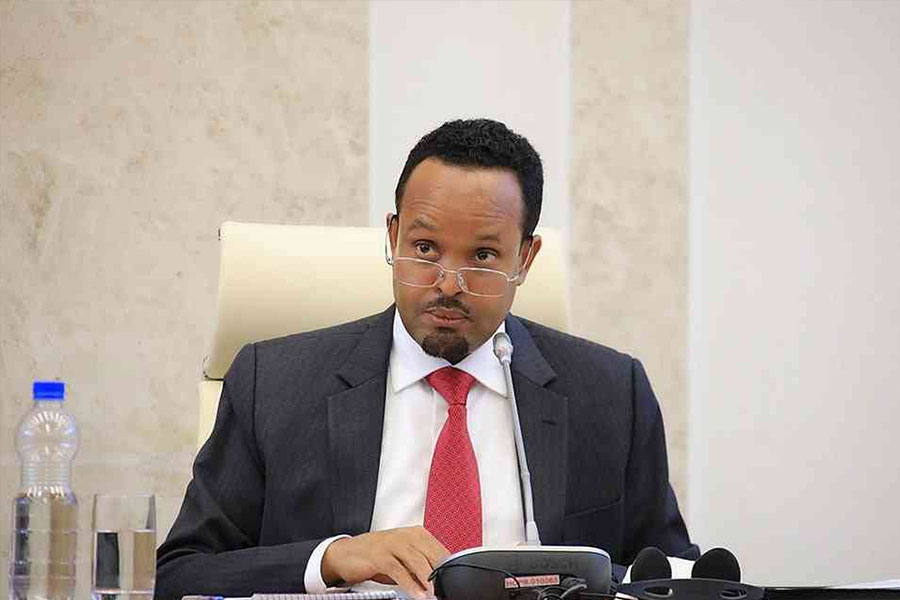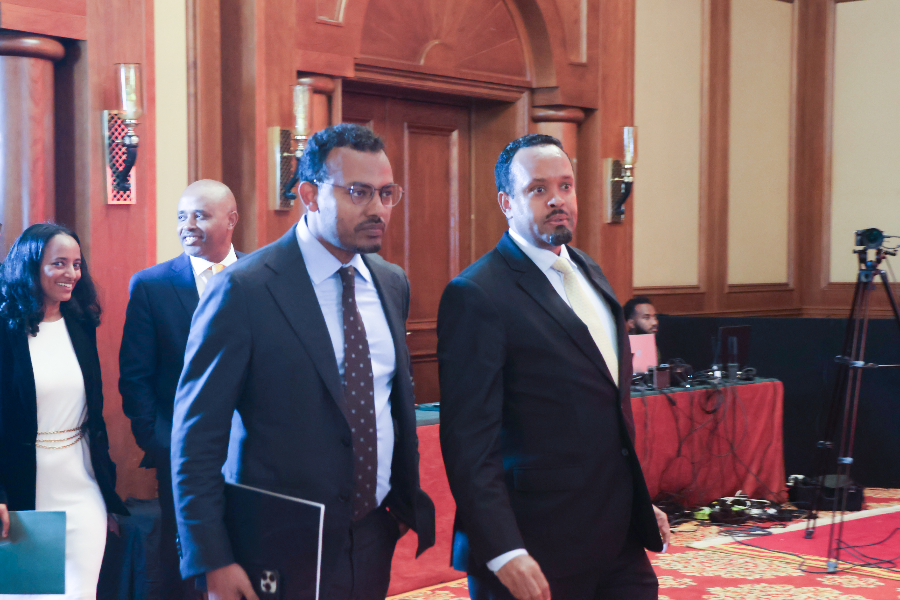
Editorial | Jun 17,2023
The federal budget bill, edging towards a monumental trillion Birr, has sparked heated contention as it progresses through legislative channels at the Parliament. In a two-day hearing convened by the Standing Committee for Plan, Budget & Financial Affairs, divisions emerged between the budget authors at the Ministry of Finance and lawmakers and beneficiaries clamouring for critical investments across their constituencies.
Central to the discord were public universities struggling with suspended projects and stringent financial leashes pending a sweeping overhaul of higher education.
Lemi Guta (PhD), president of Adama Science & Technology University, challenged the Ministry's decision to halt projects, advocating instead for a temporary freeze to prevent the disruption of ongoing construction efforts with contracted firms.
"Our ability to sustain operations is under severe strain," bemoaned Lemi, whose Institution faces a proposed budget of 750 million Br — an amount he argues falls short of supporting new student enrollments amidst growing resource limitations. "Some of the projects already have contractors."
He forewarned that a meagre amount (22 Br per day) allotted for student feeding would undermine the education process in the coming year.
Universities face a dilemma as they adapt to the recent reclassification of higher education institutions into four categories. Kotebe University of Education, led by Berhanemesqel Tena (PhD), is a notable example. Operating with a faculty of 150 teachers and an annual acceptance rate of 500 new students, the University struggles with outdated infrastructure and increased operational burdens.
Kotebe University, on the northern outskirts of Addis Abeba, contends with 50 dilapidated classrooms and delays in crucial infrastructure projects. The Institution's efforts are further complicated by inflation and bureaucratic hurdles, despite a budget allocation of 446 million Br.
"The purchasing power of our funds has diminished," said Berhanemesqel, referring to the financial strain.
The recent reshuffling has shifted the University's reporting structure from the Addis Abeba City Administration to the Ministry of Education, deepening existing issues, with delayed payments and rising costs affecting progress on building construction projects.
The federal government's new policy direction, placing importance on investment in kindergartens over university infrastructure, has further unsettled academic leaders like Berhanemesqel and Lemi. State Minister for Finance Eyob Tekalegn (PhD) recently informed Parliament that the longstanding practice of prioritizing brick-and-mortar university campus construction would no longer be feasible.
The education sector has been allocated 79.8 billion Br for the upcoming fiscal year, making it the fifth-highest funded sector out of 20, with 8.22pc of the budget. The federal government administers 42 of the 83 universities and colleges in the country.
Beyond the academic sector, stakeholders across various domains expressed scepticism about the budget's adequacy in addressing infrastructure deficiencies nationwide. However, the goals of the universities will need to take a back seat as the Finance Ministry looks to calibrate aspirations for increased domestic revenue, a budget deficit of less than three percent in GDP ratio, and single-digit inflation rates.
Tesfaye Bekele, representing the Gindeberet Association of Elders, a rural community 178Km west of Addis Abeba, drew attention to protracted delays in road construction projects, vital for facilitating economic activities and enhancing governance in remote regions.
"Residents endure considerable hardships," said Tesfaye.
Students from the 100 schools within the expansive Woreda had to travel several tens of kilometres on foot to attend national examinations. He said residents had been frequenting visits to the Ethiopian Road Administration (ERA) and have petitioned the Prime Minister's Office, hoping to get some relief to an infrastructure question going back five decades.
"Budget increments need to be accompanied by increased accountability and results," Tesfaye said.
Tesfaye's is a voice shared by many nationwide over the discernible impact of inadequate infrastructure on community welfare and economic productivity.
For Teferi Demeke, director of Budget Preparation & Administration, the imperative of macroeconomic stability and fiscal prudence amid global economic uncertainties justifies a tight budget. He defended the Administration strategy, which focused on reducing reliance on external financing. International sources are expected to contribute only 8.5pc of the proposed 971 billion Br budget.
"Diversifying revenue streams and enhancing domestic borrowing is critical to push back inflationary pressures," said Teferi. "The government is committed to sustainable fiscal policies in the face of mounting global economic challenges."
According to Eyob Tekalegn (PhD), state minister for Finance, the budget's strategic imperatives are broadening the tax base and improving revenue collection efficiency. He dismissed expectations for additional budgetary allocations, attributing the proposed 170 billion Br expansion to current fiscal pressures demanding caution and budgetary restraints.
"Transitioning away from a dependency mindset towards promoting self-reliance is important," the State Minister said.
He disclosed a shift in his administration's policy of encouraging economic independence and equitable development across all regional states.
"This has been a dangerous dichotomy," he said. "Every Ethiopian's fate is singular."
He disclosed a pending reform to the safety net program as part of a high-level political, ideological shift that removes the "temperament of looking at handouts."
"Helping people to help themselves should be the goal," Eyob told Parliament.
The state minister stressed that the exhaustive collection of taxes through a comprehensive reform of the tax authority, amendments to tax laws, and new taxes would take precedence in the coming year. He expressed the high likelihood of a successful debt restructuring through the G-20 Common in the next few months as creditors also pushed back the deadline for an agreement a few months ahead.
"A meaningful debt restructure is imminent," Eyob said.
Nevertheless, demands persist in aligning budget allocations with developmental priorities across Ethiopia's diverse regions.
Eshetu G. Mariam (MP-PP) stated disparities in infrastructure development, particularly in mineral-rich areas such as Gambella and Benishangul-Gumuz regional states, where inadequate road networks hinder economic potential and regulatory enforcement.
"Improving infrastructure access is crucial to unlocking economic opportunities and enhancing governance," said Eshetu, advocating for targeted investments to stimulate regional growth and combat illicit activities, including illegal mining operations. "Even legal enforcement becomes impossible without proper roads."
He referred to a 90Km stretch of road in Bero Woreda in South Western Regional State that has been dragging for the past decade, limiting the productivity of the rich gold mines.
"These are sectors which have profound national implications," he told Fortune.
The federal government's upcoming fiscal year budget proposal reveals a shift in strategy toward prioritising the completion of existing infrastructure projects over new initiatives. Allocating 283 billion Br to capital expenditures marks a substantial 39pc increase from the previous year. The uptick, however, comes against a backdrop of declining capital expenditures as a percentage of GDP over the past five years.
Federal institutions, from the Ministry of Foreign Affairs to the recently established Ethiopian Forestry Development, have vigorously advocated for increased budgetary allocations, each articulating their specific aspirations and operational costs.
However, ongoing negotiations on debt restructuring and comprehensive tax reforms to bolster domestic revenue streams are critical to the fiscal roadmap. Federal officials expressed confidence in securing favourable terms through discussions with external creditors under the G-20 Common Framework, viewing these negotiations as crucial to easing Ethiopia's debt burden.
Yehualeshet Agez, head of Resource Management at the Ministry of Justice, emphasised the necessity of reforming feeding programs within penal institutions to preempt potential human rights concerns. He commended the Ministry of Finance for its support in providing foreign currency during international litigations, while recalling the need for additional resources to enhance security and supervision within the country's prisons.
"This is an area where digitization will have profound implications," said Yehualeshet, pointing to the transformative potential of technological advancements in prison management and oversight.
PUBLISHED ON
Jun 29,2024 [ VOL
25 , NO
1261]

Editorial | Jun 17,2023

Viewpoints | May 25,2024

Fortune News | Feb 05,2022

Agenda | Sep 21,2019

Viewpoints | Aug 28,2021

Fortune News | Jun 15,2025

Fortune News | Jul 01,2023

Fortune News | Jul 13,2025

Radar | Apr 13,2025

Viewpoints | Mar 23,2024

Dec 22 , 2024 . By TIZITA SHEWAFERAW
Charged with transforming colossal state-owned enterprises into modern and competitiv...

Aug 18 , 2024 . By AKSAH ITALO
Although predictable Yonas Zerihun's job in the ride-hailing service is not immune to...

Jul 28 , 2024 . By TIZITA SHEWAFERAW
Unhabitual, perhaps too many, Samuel Gebreyohannes, 38, used to occasionally enjoy a couple of beers at breakfast. However, he recently swit...

Jul 13 , 2024 . By AKSAH ITALO
Investors who rely on tractors, trucks, and field vehicles for commuting, transporting commodities, and f...

Oct 18 , 2025
The political establishment, notably the ruling party and its top brass, has become p...

Oct 11 , 2025
Ladislas Farago, a roving Associated Press (AP) correspondent, arrived in Ethiopia in...

Oct 4 , 2025
Eyob Tekalegn (PhD) had been in the Governor's chair for only weeks when, on Septembe...

Sep 27 , 2025
Four years into an experiment with “shock therapy” in education, the national moo...